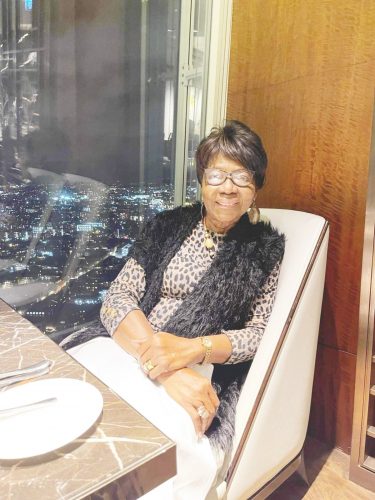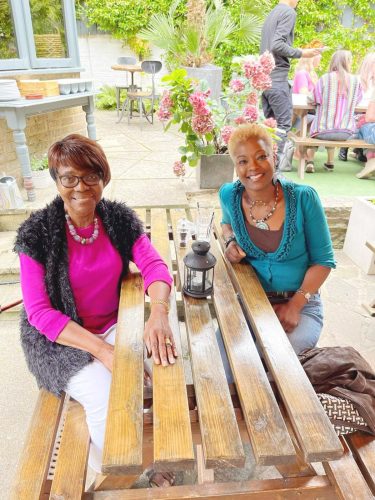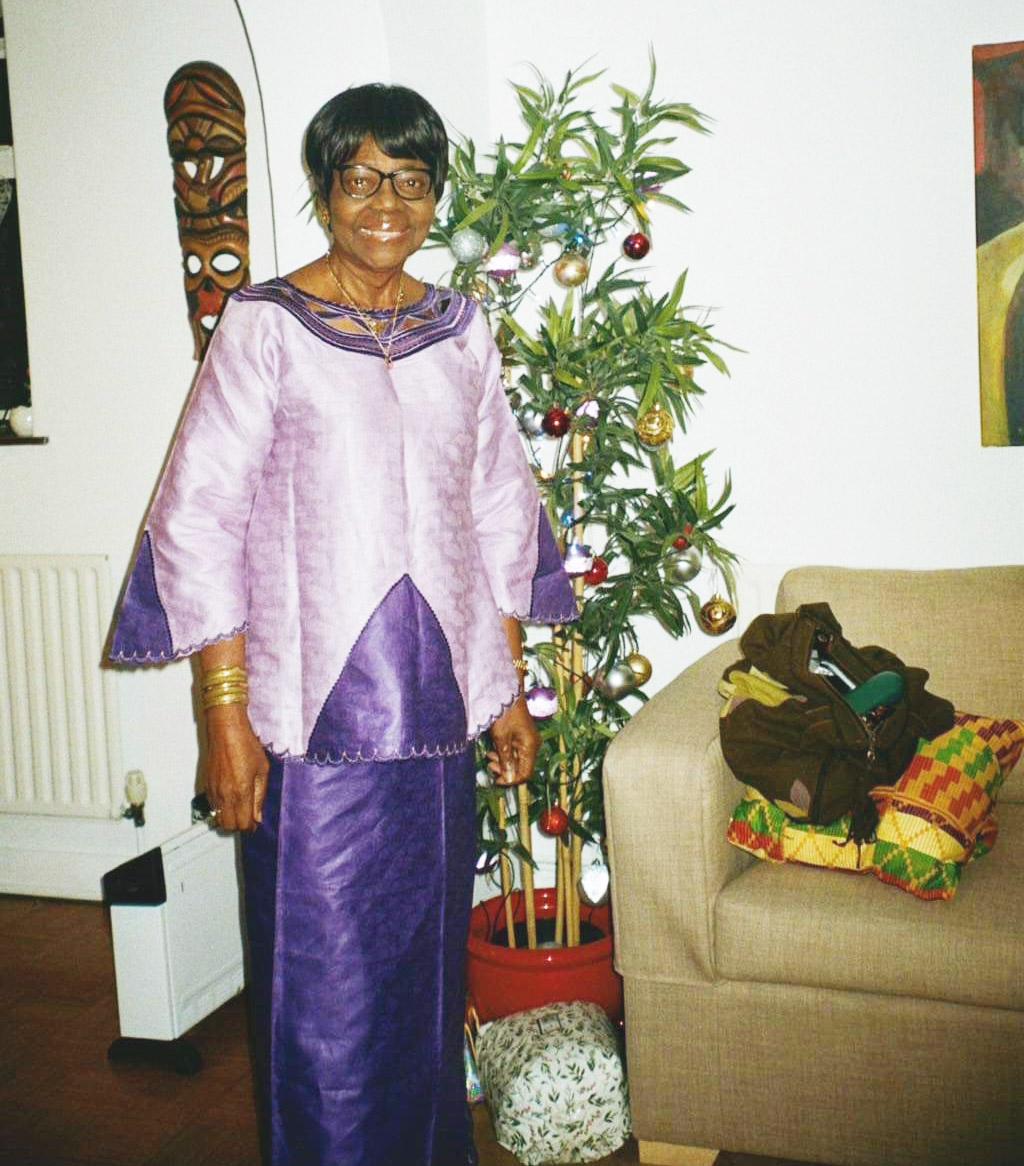Gwendolin Tross has survived cancer four times, the most recent being last year, but as painful as those diagnoses and follow-up treatments have been, a continuous ache for this 81-year-old retiree is the state of nursing in Guyana.
Tross, who could be described as coming from the ‘old school,’ gave all of her professional life to nursing education, both locally and overseas, and is credited for developing the curriculum for the nursing degree at the University of Guyana.
Now that she has retired and lives a quiet life in her Lamaha Gardens home with her husband Samuel Tross, she is unhappy with what passes for the nursing profession in Guyana and for her the blame does not fall in one place. It has to do with the policymakers, but also the nurses themselves, who seem afraid to mobilize and collectively push for better and also the manner in which some of them treat their patients.

Tross said that while nurses are doing well in Guyana, they are not recognised as they should be and as a result they are leaving. “England is recruiting them left, right and centre,” she told Stabroek Weekend in an interview.
“It disturbs me because the whole point of that degree programme was to facilitate improvement of nursing care here. That was it. That was it. But it is not happening. It is not happening…”
She shared that even in the pandemic 14 students recently gained distinctions in the degree programme and many of them had fantastic and innovative projects, but the question is whether there are systems in place to evaluate what students did and how they can be applied and implemented to improve the profession.

On the other hand, a passionate Tross said, it appears as if the nurses themselves are scared as they are not coming together and recognising that in unity there is strength.
“They don’t have much respect for the Guyana Nursing Association; come and change it. Not one individual could do anything, but if you come together as a group… They have no voice, they are scared it would appear,” Tross said.
Asked how the situation makes her feel Tross said, “Bad, bad. Because you have to have conviction if you want change; you can’t be quiet. You have to speak up but not you
Alone. If you get a group together and you do your research and you can justify why you feel the way you feel… I am speaking from experience.”
Tross said she is not seeing or feeling such a spirit even as she continues to help the nursing association as much as she can.
And while there are good nurses, Tross said there are too many who are not. She gave the example of doctors doing their rounds while the nurses remain seated at their desk. Instead of being with the doctor they would flippantly say, “Look the chart up deh”.
Tross, who continues to contribute financially through the Gwen Tross Research Foundation, which helps to fund to best degree research project, said nurses need to recognise their responsibility and they should document what is happening on the ward to share with the doctor.
She believes that some of those who are entering the profession do not really understand what nursing is all about, are not committed and probably see it as a way to get out.
However, she noted that it has to work both ways. She said if things were organised and the culture was encouraging, nurses who attend UG and do well should expect and receive a raise in pay and to be consulted on areas they are strong in. But that does not happen, and the nurses give up.
Tross noted that people are making decisions and policies about nursing when they don’t have a clue and there is no nurse to come forward and say anything.
Always her dream
The fact that Tross never really practiced as a nurse but was always involved in imparting knowledge was no mistake, as she shared that teaching was always her dream. But because she could not join the teaching profession immediately after school, nursing was the next best thing.
She started nursing in Guyana but completed her studies in England, where she also did midwifery before returning to Guyana. She got married in England. Back in Guyana she became employed at the nursing school. Through scholarships, she completed studies in public health at the University of Guyana and advanced nursing education at the University of the West Indies.
Her husband later got a job which saw them moving to Zambia and by then they had four children. In Zambia, Tross said, she became bored as her children were sent to England to boarding school, but she eventually got a job that allowed her to take refugees from Zambia to Zimbabwe, which she found very interesting. She later got a scholarship to complete her master’s in International Community Health in England.
Wanting to remain in England with her children, Tross said, she eventually became employed but she found it challenging as she was the only black woman at the nursing school and the only one with a master’s degree. She became emotional as she spoke of her experience at that nursing school but pointed out that she never gave up and instead persevered.
She later became employed at the University of Wolverhampton in England, which was a joint appointment between the university and the school of nursing. In a year, she was made senior lecturer and in the 11 years she spent there she introduced trans-cultural nursing and taught research. Tross recalled that she was given a module that did not reflect the ethnic minorities and she raised this issue and was then tasked with developing half a module focusing on this.
She wrote an article on the issue, which was published, and the response was overwhelming as people wanted to hear more about trans-cultural nursing.
“If I didn’t have those negative experiences, I could not have developed the resilience that I developed and be able to come home to start the BSc degree because it was not easy here either. It was, ‘she come from England, who she think she be?’” Tross shared.
When she returned to Guyana, Tross taught in the Health Sciences Faculty and she said she was shocked that there was no degree programme for nursing. Some nurses who wanted to further their studies had to do something in the Education Faculty.
It was with the encouragement of Dr Emmanuel Cummings, who is now Dean of the Faculty of Health Sciences, that she developed the curriculum for the degree programme.
“But it was not easy. Our people are not easy… the challenges were many. But what I am saying, and I usually share this with students, sometimes these negative experiences are meant to project you, so you don’t give up,” she stated.
Tross said she kept pushing as well because she wanted to see improvement in the profession in Guyana.
Cancer survivor
Tross was forced to stop lecturing in 2008, when she was diagnosed with cancer of the thyroid, but when she thought treatment was over and she was healed, the following year she was diagnosed with colon cancer. Treatment was administered, but by 2010 she was also diagnosed with cancer of the liver and this resulted in a partial liver resection, which is a type of surgery designed to remove cancerous tumors from the liver.
Last year, the cancer returned to her thyroid, which she said came as a surprise as in 2008 she had a total thyroid lobectomy. She recalled that last year the heat became intolerable and she was just feeling unwell. One of her former students, who is now a doctor, insisted that she had some investigations done. When she got the results she recognised something was amiss, and she sent them to her daughter who is doctor in England. Her daughter instructed her to travel to England.
“To tell you the truth I wasn’t too keen because I thought, ‘Look I have had all these surgeries, I don’t think I want to do more surgeries.’ I told my husband, ‘I don’t think I want any more surgeries. I am ready to go and meet my Lord and Saviour.’ And he said ‘no, no you can’t say that,’” Tross recalled.
Her decision to travel came after she read a 78th birthday gift in the form of a book that she had not opened prior. The title was Thy Will be Done and it is of a young man sharing his experience about the awesomeness of God in his life. Tross said she asked God for forgiveness “and this is how I travelled to England”.
She described her treatment in England last year as amazing; following the July 5 surgery she had to undergo radioactive iodine therapy.
In 2008, it was a swelling in her neck that indicated something was wrong and while initially she was told it was a cyst, it was later discovered that it was in fact cancer.
It was in England that a needle biopsy confirmed that it was cancer and Tross recalled the experience as being traumatic adding that she is still suffers from the effects of the chemotherapy; her entire left foot and part of her right foot remain numb.
She said while being treated in England, she wished that some of Guyana’s nurses could witness how cancer patients are treated. She recalled that she saw some of the nurses were tired, but they never made her feel as if she was a burden.
“The attitude, their behaviour towards the patients it was something…very much unlike what happens here I am told,” Tross said.
She recalled not so long ago a nurse was stricken with cancer and hospitalised and the treatment she received from her colleagues left a lot to be desired. She visited that patient who complained about the manner in which she was being treated by the nurses and Tross pointed out that if that was a nurse one can imagine what the ordinary patients experience. That patient died and she shared that another nurse had the same experience and she eventually died as well. She said it was not just them dying, but how they would have felt during the final stages of their lives.
“… It really hurts me to see how patients are being treated. There is a lack of understanding of the emotional issues that arise with cancer and the need for support because I had a lot of support, not only from my family but from friends,” she said, getting emotional.
“God is awesome. We have to believe. I have a testimony and I share my experiences because…look at me I am 81,” Tross said, as she reflected all that she experienced health wise but is still alive and very active.
She said she is humbled that God allowed her to make a contribution to the profession locally and she hopes that others would do the same as they have a responsibility as it is not just about earning money but helping to develop the profession.
Tross is one six Guyanese whose contributions are highlighted in the book Nursing A Nation: An Anthology of African and Caribbean Contributions to Britain’s Health Services.





